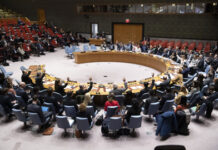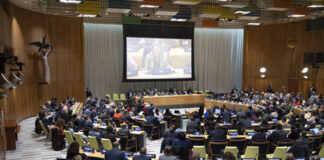French / Français
Les femmes sont indispensables à l’industrialisation de l’Afrique (ONU)
Selon António Guterres, s’il est essentiel d’accélérer l’industrialisation de l’Afrique afin de promouvoir la croissance, diversifier les économies, renforcer la résilience, stimuler la création...
les produits du terroir en vedette
Photo credit: DiasporaEngager (www.DiasporaEngager.com).
Considéré comme un fleuron du Salon international de l’agriculture au Maroc (SIAM), le pôle "Produits du terroir", qui se veut...
GLOBAL DIASPORA NEWS
SAPS blows over R42 million in petrol for VIP protection
Photo credit: DiasporaEngager (www.DiasporaEngager.com).
The South African Police Service (SAPS) has spent over R42,67 million on petrol and diesel over the past six years purely...
US Official Blames Hamas Leader Sinwar for Lack of Hostage Deal
Photo credit: DiasporaEngager (www.DiasporaEngager.com).
At a recent US State Department briefing, an American official told reporters that Yahya Sinwar, leader of the Hamas terrorist group...
African Diaspora Leaders
The March Against Displacement in Harlem and Palestine!
Photo credit: DiasporaEngager (www.DiasporaEngager.com).
By Herb Boyd —
First I heard the drumming, then the chants of “Viva, Viva Palestina!” from a long line of protesters...
No Place to Make a Vote of Thanks
Photo credit: DiasporaEngager (www.DiasporaEngager.com).
On the long tradition of Black third-party activism.
By Marc Blanc, HNN —
From its start on June 5, 2023, Cornel West’s chaotic...
Putin, Trump and Netanyahu unveil the terrifying perils of strongman rule
Photo credit: DiasporaEngager (www.DiasporaEngager.com).
By Thom Hartmann —
The most amazing thing about Donald Trump’s current criminal trial is that it is happening at all. He...
Free Palestine Non-Violently — Vantage Point Vignette by Dr. Ron Daniels
Photo credit: DiasporaEngager (www.DiasporaEngager.com).
Vantage Point VignettesComments and Commentary by Dr. Ron Daniels
A determined new multiracial, multireligious generation of college and university students, including a...
The stunning rebirth of the American labor movement
Photo credit: DiasporaEngager (www.DiasporaEngager.com).
The pendulum is swinging toward countervailing power.
By Robert Reich —
On Friday, Volkswagen employees in Chattanooga, Tennessee, voted overwhelmingly to join the...
BUSINESS, FINANCE & ECONOMY
Immigration, Brain Drain & Refugees
World News in Brief: ‘Barbaric’ sexual violence in Sudan, Haiti’s transitional...
Special Representative on Sexual Violence in Conflict Pramila Patten together with Deputy Emergency Relief Coordinator Joyce Msuya, said that more than a year into...
Philanthropy, Fundraising & Humanitarian
UNRWA committed to implement independent review recommendations
Commissioner-General Philippe Lazzarini briefed journalists in New York a day after the independent review panel published its findings. Former French Foreign Minister Catherine Colonna spearheaded...
Desperate Afghan returnees from Pakistan face uncertain future: IOM
According to IOM, in the past two months alone, nearly 375,000 Afghans left Pakistan, primarily utilizing the Torkham and Spin Boldak border crossings, near...
World News in Brief: South Sudan tax impositions, Somalia flash floods,...
“Until they are released, we will not be able to conduct many of our activities in support of the communities in need across the...
World News in Brief: Nigeria airstrikes condemned, supporting Venezuelan migrants and...
OHCHR issued a statement deploring the latest strike – the fourth since 2017 – which took place in Kaduna state in the north on...
Global Refugee Forum opens amid ‘crisis of humanity’
The world’s largest gathering dedicated to refugee issues, the Forum is co-hosted by UNHCR and Switzerland and convened by Colombia, France, Japan, Jordan and...
Global Refugee Forum ends with bold pledges, solutions for displaced
Speaking at the closing of the Global Refugee Forum, the Secretary-General said that protection and help for these most vulnerable of people, was “an...
OTHER LANGUAGES (SPANISH, FRENCH, INDONESIAN, BRAZILIAN, ETC.)
Haiti vive pior crise humanitária desde terremoto de 2010
O diretor executivo adjunto do Programa Mundial de Alimentos, PMA, Carl Skau, afirmou nesta quinta-feira que o Haiti enfrenta a pior crise humanitária desde...
El consumo de alcohol y nicotina está aumentando entre los jóvenes...
El consumo de alcohol y nicotina está aumentando entre los jóvenes de Europa, Asia Central y Canadá, y las chicas igualan o incluso superan...
PROPHETIC NEWS
Sustainability, Climate & Environment
Polluting rivers, beaches and the ocean: How can Trinidad solve its...
The Maraval river winds its way through Port of Spain, the capital of Trinidad & Tobago, reaching the sea at Invaders Bay, the evocative...
SCIENCE, TECHNOLOGY & RESEARCH
Conflict, Peace & Security
Lifestyle, Beauty, Culture & Opinion
News in Brief 13 December 2023 |
This is the News in Brief from the United Nations. Gaza ceasefire ‘in everybody’s interest’: UN humanitarian coordinatorA ceasefire in Gaza is “the only way...
Top Tips for Healthy Holiday Travel | DNPAO
Photo credit: DiasporaEngager (www.DiasporaEngager.com).
It’s the holiday season again! If you are preparing for holiday travel by land or air, these tips can help you...














































































